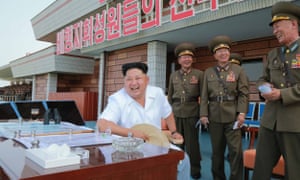It is a problem for small states everywhere overshadowed by mighty neighbours. How to stick out? And perhaps assert national pride at the same time?
On Friday North Korea came up with its own typically idiosyncratic answer, announcing that from next week it will use its own unique time zone. Pyongyang said that it will pull back its current standard time by 30 minutes, making it GMT +8.30, rather than GMT +9.

The move is a diplomatic salvo aimed squarely at Japan, the country’s former colonial overlord. Local time in North and South Korea and Japan has been the same since Japan’s rule over what was a single Korea between 1910 and 1945.
The North’s official Korean Central News Agency said that the establishment of a sovereign “Pyongyang time” was aimed at what it called rooting out the legacy of the Japanese colonial period.
The new time zone will take effect on 15 August – the 70th anniversary of Korea’s liberation from Japanese rule at the end of the second world war.
“The wicked Japanese imperialists committed such unpardonable crimes as depriving Korea of even its standard time while mercilessly trampling down its land with 5,000-year-long history and culture and pursuing the unheard-of policy of obliterating the Korean nation,” the KCNA dispatch said, in classically accusing tones.
North Korea now joins a select club of small, proud nations that have anomalous time zones. It includes the mountain kingdom of Nepal, which at GMT +5.45 is 15 minutes ahead of Delhi, its vast neighbour. Kathmandu adopted Nepal Standard Time in 1956. It has stuck with it, ostensibly in order to balance its sprawling eastern and western halves.



